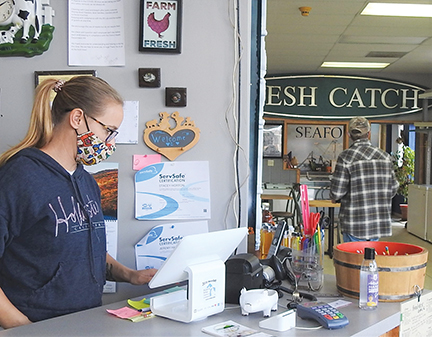Drug record no longer stops food aid

News Photo by Julie Riddle Manager Stacey Horton tends the register of the Alpena General Store while Assistant Manager Jeremy Hamann totes a basketful of meat. People who need help accessing healthy food should be given that help, Horton said.
ALPENA — People with substance use disorders need to eat, the state decided recently when it removed a provision that keeps people with drug-related felonies from receiving help paying for their groceries.
Since 2011, people convicted of two or more drug-related felonies have been banned for life from the federal Supplemental Nutrition Assistance Program that helps one in eight people in Michigan access food every year.
As of Oct. 1, that restriction is lifted, at least for the next year.
The 2021 state budget recently signed by Gov. Gretchen Whitmer removes the Michigan Department of Health and Human Services ban on benefits for people with felony convictions for illegal drug possession, distribution, or use.
A bill that would make the change permanent passed the state Senate and is currently being reviewed by a committee.
In September, DHHS made food assistance payments totaling nearly $1.3 million to more than 7,400 Northeast Michiganders, according to a DHHS report.
None of those, however, were people trying to get back on their feet and stay sober after a drug conviction.
Alpena General Store Manager Stacey Horton rings up groceries paid for with SNAP benefits several times a week.
Denying food benefits for people trying to get their lives back in order while fighting drug addiction seems like a bad idea, Horton said, applauding the change.
Access to healthy, filling food is important to everyone, said Horton, who signed up for food benefits herself this summer when the coronavirus pandemic made finances tight.
“Why not get help, if you can?” said the single mom.
The change at state level is good, but it’s not nearly enough, said Dr. Jason Beatty, medical director of Freedom Recovery Center in Alpena.
Taking food benefits away from people with drug felonies was an atrocity — one of many blows the justice system levies against people with addictions, Beatty said.
People with drug felonies — most of whom, Beatty contends, need treatment, not incarceration — are already kept from many jobs and educational opportunities because of their criminal records. Removing food benefits was as good as taking away their legal ability to feed themselves, he said.
The recent decision to restore those benefits is merely a pacifier, offering back one of the services people with substance use disorders should have had all along, Beatty said.
“Why aren’t we giving them all back?” Beatty said. “Why aren’t we removing the stigma completely? That’s what I’m pushing for.”



